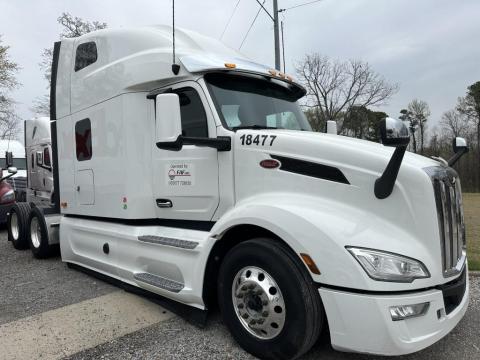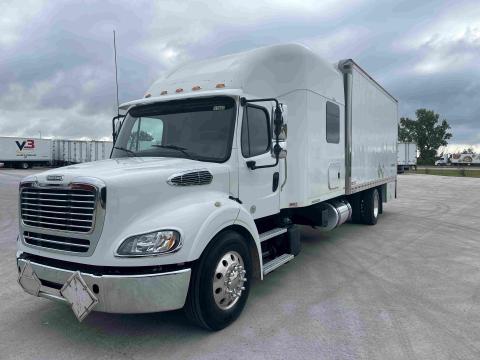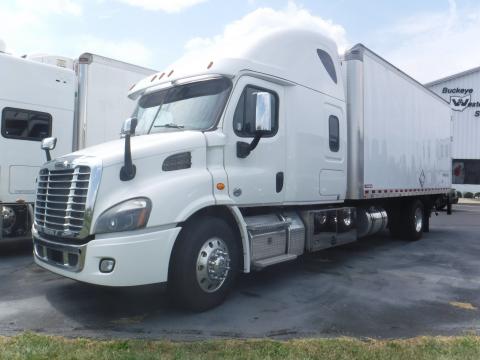Expedite Box Trucks For Sale: Your Comprehensive Guide to Entering the Fast Lane of Freight pickup.truckstrend.com
In the dynamic world of logistics, time is money, and efficiency is king. When critical shipments demand immediate attention and direct delivery, standard freight methods often fall short. This is where expedite box trucks step in, forming the backbone of a specialized niche in the trucking industry dedicated to rapid, time-sensitive transportation. For entrepreneurs and owner-operators looking to enter a lucrative segment of the freight market, understanding "Expedite Box Trucks For Sale" is the first crucial step.
This comprehensive guide will delve into every aspect of acquiring and operating an expedite box truck, offering insights, practical advice, and essential information to help you navigate this exciting and demanding sector.
Expedite Box Trucks For Sale: Your Comprehensive Guide to Entering the Fast Lane of Freight
What is Expedite Freight and Why Box Trucks?
Expedite freight refers to the urgent, time-critical transportation of goods, often with tight deadlines, specific delivery windows, or high-value cargo. This can include anything from manufacturing parts needed to prevent a production line shutdown, medical supplies for emergency procedures, aerospace components, or sensitive documents. The defining characteristic is speed and directness – often door-to-door, without intermediate stops or transfers.
While smaller cargo vans (like Sprinters) handle lighter, smaller expedite loads, and full semi-trucks manage larger, heavier shipments, expedite box trucks occupy a vital sweet spot. They offer significantly more cargo capacity than a van while often operating without the need for a Commercial Driver’s License (CDL), making them accessible to a wider pool of drivers. This unique combination of capacity, maneuverability, and lower barrier to entry makes the expedite box truck an ideal vehicle for a vast range of urgent logistics needs.
Why Choose an Expedite Box Truck for Your Business?
Investing in an expedite box truck offers several compelling advantages for aspiring owner-operators or expanding logistics companies:
- Versatile Capacity: Box trucks typically range from 16 to 26 feet in length, providing ample space for pallets, crates, and oddly shaped items that wouldn’t fit in a cargo van. This allows you to handle a broader range of expedite loads.
- No CDL Requirement (Often): Most expedite box trucks have a Gross Vehicle Weight Rating (GVWR) under 26,001 pounds, meaning they can be driven with a standard Class D driver’s license. This significantly lowers the entry barrier compared to operating a semi-truck.
- Higher Earning Potential: Expedite loads generally pay more per mile than standard freight due to their urgency and specialized nature. The added capacity of a box truck over a cargo van often translates to higher revenue per load.
- Sleeper Berth Potential: Many expedite box trucks are equipped with or can be outfitted with a sleeper berth, allowing for over-the-road (OTR) operations and maximizing driver uptime for long-haul expedite runs.
- Direct Delivery Focus: Expedite work often involves direct point-to-point delivery, minimizing the complexities of multiple stops, loading dock wait times, and freight consolidation that characterize traditional LTL (Less Than Truckload) operations.

Key Features to Look for in an Expedite Box Truck

When sifting through "Expedite Box Trucks For Sale," paying attention to specific features can make a significant difference in your operational efficiency and profitability:
- GVWR (Gross Vehicle Weight Rating): Ensure it’s under 26,001 lbs if you plan to operate without a CDL.
- Box Length: Common lengths are 16, 22, and 24 feet. Longer boxes offer more capacity but can be less maneuverable in tight spaces. Consider the typical freight you aim to haul.
- Sleeper Berth: Essential for long-haul expedite operations. Look for integrated factory sleepers or well-installed aftermarket options with amenities like climate control, power outlets, and storage.
- Liftgate: While adding weight and maintenance, a liftgate is invaluable for deliveries to locations without loading docks, significantly expanding your potential client base.
- E-Track/Logistic Posts: These systems are crucial for securing cargo, preventing damage during transit, and maximizing load stability.
- Engine & Transmission: Reliability is paramount. Research common issues with specific engine and transmission models. Diesel engines are preferred for their durability and fuel efficiency over long distances.
- Mileage and Maintenance History: For used trucks, a detailed maintenance record is non-negotiable. Lower mileage is generally better, but a well-maintained high-mileage truck can still be a good buy.
- Fuel Tank Capacity: Larger tanks reduce the frequency of fueling stops, saving time on urgent runs.
- Auxiliary Power Unit (APU): An APU can power the sleeper’s climate control and electronics without idling the main engine, saving fuel and reducing engine wear.

New vs. Used Expedite Box Trucks
The decision between a new and used expedite box truck is a critical one, impacting your initial investment, ongoing costs, and peace of mind.
New Expedite Box Trucks
- Pros: Full manufacturer warranty, latest technology and safety features, no prior wear and tear, often eligible for better financing rates.
- Cons: Higher upfront cost, immediate depreciation, longer lead times for custom builds.
- Ideal For: Businesses with strong capital, those prioritizing reliability and warranty, or those needing very specific configurations.
Used Expedite Box Trucks
- Pros: Significantly lower purchase price, depreciation has already occurred, wider selection available immediately, potentially higher-spec models available within budget.
- Cons: No warranty (or limited), potential for hidden mechanical issues, higher immediate maintenance needs, older technology.
- Ideal For: New owner-operators, those with limited capital, or those comfortable with mechanical inspections and potential repairs.
- Critical Advice: Always get a comprehensive pre-purchase inspection (PPI) from an independent, trusted mechanic specializing in commercial vehicles. Check for rust, frame damage, engine health, transmission function, and tire condition.
Financing Your Expedite Box Truck
Acquiring an expedite box truck, whether new or used, represents a substantial investment. Understanding your financing options is crucial:
- Traditional Bank Loans: Commercial vehicle loans from banks or credit unions. Requires good credit and a solid business plan.
- Equipment Financing Companies: Specialists in commercial vehicle loans, often more flexible with credit requirements but may have higher interest rates.
- Dealership Financing: Many dealerships offer in-house financing or work with preferred lenders. Convenient, but compare rates with other options.
- SBA Loans: Small Business Administration (SBA) guaranteed loans can offer favorable terms for qualifying small businesses.
- Leasing: An alternative to buying, leasing can offer lower monthly payments and flexibility, but you won’t own the truck at the end of the term (unless it’s a finance lease with a buyout option).
Key Considerations: Your credit score, down payment, and the strength of your business plan will heavily influence loan approval and interest rates. A significant down payment can reduce your monthly payments and overall interest paid.
Where to Find Expedite Box Trucks For Sale
The market for expedite box trucks is diverse. Here are the primary avenues to explore:
- Commercial Truck Dealerships: Both new and used truck dealerships often have dedicated sections for medium-duty trucks suitable for expedite work. They can offer financing and sometimes provide warranties on used vehicles.
- Online Marketplaces:
- TruckPaper.com: A leading online marketplace for commercial trucks and trailers.
- CommercialTruckTrader.com: Another popular platform with a wide selection.
- eBay Motors / Craigslist: Can yield local deals, but require extra caution and thorough inspection.
- Facebook Marketplace/Groups: Many trucking-specific groups exist where trucks are bought and sold by owner-operators.
- Auctions: Public or dealer-only auctions can offer competitive prices, but buying at auction requires expertise in vehicle assessment as "as-is, where-is" sales are common.
- Fleet Sales: Larger logistics companies sometimes refresh their fleets, selling off well-maintained used trucks directly.
Important Considerations Before Buying
Beyond the truck itself, several operational and regulatory factors demand your attention:
- CDL Requirements: While many expedite box trucks don’t require a CDL, always verify the specific GVWR of the truck you’re considering. If it exceeds 26,000 lbs, a CDL will be necessary.
- Insurance: Commercial auto insurance is mandatory and typically more expensive than personal auto insurance. You’ll need liability, physical damage, and cargo insurance. Shop around for specialized policies.
- Operating Authority: If you plan to operate independently (not leased to a carrier), you’ll need to obtain your own MC (Motor Carrier) number and DOT (Department of Transportation) number from the FMCSA.
- Maintenance & Repairs: Downtime is lost income. Factor in the cost of regular preventative maintenance (PMs), tires, and unexpected repairs. Having a reserve fund for this is critical.
- Business Plan: Develop a solid business plan outlining your target market, operating costs (fuel, insurance, maintenance, tolls, permits, ELD), revenue projections, and profit margins.
Operating Your Expedite Box Truck Business
Once you have your truck, the real work begins. Here’s how to get it rolling:
- Finding Loads:
- Load Boards: Platforms like DAT Solutions, Truckstop.com, and Syfan Logistics are popular for finding expedite loads.
- Brokers: Establish relationships with reputable freight brokers specializing in expedite freight.
- Direct Clients: Over time, you might build direct relationships with manufacturers or businesses needing regular expedited services.
- Electronic Logging Devices (ELDs): Compliance with ELD mandates for recording Hours of Service (HOS) is essential.
- Fuel Management: Fuel is a major expense. Use fuel cards for discounts, plan routes to optimize fuel stops, and practice fuel-efficient driving habits.
- Networking: Connect with other owner-operators, brokers, and industry professionals. Word-of-mouth and referrals are powerful in this industry.
Potential Challenges and Solutions
Like any business, expedite trucking comes with its own set of hurdles:
- Challenge: Downtime: Mechanical breakdowns or maintenance can sideline your truck, leading to lost revenue.
- Solution: Adhere strictly to preventative maintenance schedules. Have a reliable mechanic on call. Build a contingency fund for unexpected repairs.
- Challenge: Fluctuating Fuel Prices: Volatile fuel costs can eat into profits.
- Solution: Utilize fuel cards, optimize routes, and consider fuel surcharge clauses in contracts.
- Challenge: Finding Consistent Loads: Especially when starting, securing steady, profitable loads can be tough.
- Solution: Diversify your load board subscriptions, build strong relationships with multiple brokers, and network relentlessly. Consider leasing on with an established expedite carrier initially to gain experience and access to their freight network.
- Challenge: Competition: The expedite market can be competitive.
- Solution: Differentiate yourself through exceptional service, reliability, communication, and a willingness to go the extra mile. Specialize in a niche if possible (e.g., hazmat, high-value, specific industries).
Expedite Box Trucks For Sale: Illustrative Price Guide
Please note that prices for expedite box trucks vary significantly based on make, model, year, mileage, condition, features (sleeper, liftgate, APU), and market demand. The table below provides illustrative price ranges to give you a general idea. Always verify current market values.
| Truck Type/Size (GVWR/Box Length) | Condition | Estimated Price Range (USD) | Key Features/Considerations |
|---|---|---|---|
| Small Expedite Box Truck | Used | $20,000 – $50,000 | 16-20 ft box, minimal sleeper, higher mileage. Good entry point. |
| (Under 26,000 lbs GVWR) | New | $70,000 – $110,000 | Basic configuration, no sleeper, chassis only. |
| Mid-Size Expedite Box Truck | Used | $40,000 – $90,000 | 22-24 ft box, integrated/aftermarket sleeper, moderate mileage. Popular choice. |
| (Under 26,000 lbs GVWR) | New | $100,000 – $160,000+ | Standard specs, factory sleeper option, potentially liftgate. |
| Premium Expedite Box Truck | Used | $70,000 – $150,000+ | 24-26 ft box, custom luxury sleeper, low mileage, APU, liftgate, advanced features. |
| (Under 26,000 lbs GVWR) | New | $150,000 – $250,000+ | Fully loaded, custom build options, top-tier comfort and efficiency. |
Disclaimer: These are rough estimates and can fluctuate based on market conditions, location, specific features, and dealer markups. Always conduct thorough research and inspection.
Frequently Asked Questions (FAQ)
Q1: Do I need a CDL to drive an expedite box truck?
A1: Most expedite box trucks have a Gross Vehicle Weight Rating (GVWR) under 26,001 pounds, meaning you do not need a CDL. However, always verify the GVWR of the specific truck you are considering. If it exceeds this weight, a CDL is required.
Q2: How much money can I make with an expedite box truck?
A2: Earning potential varies widely based on factors like the number of loads you take, miles driven, fuel efficiency, operating costs (fuel, insurance, maintenance), and the rates you negotiate. Top-performing owner-operators can earn six figures in gross revenue, but net profit depends heavily on managing expenses effectively.
Q3: What are the main ongoing costs of operating an expedite box truck?
A3: Key operating costs include fuel (major expense), commercial insurance, preventative maintenance, tires, repairs, tolls, permits, ELD subscription, and potentially dispatch service fees or load board subscriptions.
Q4: How do I find loads for my expedite box truck?
A4: You can find loads through online load boards (e.g., DAT Solutions, Truckstop.com), by establishing relationships with freight brokers who specialize in expedite freight, or by directly contracting with businesses that have recurring urgent shipping needs. Some operators choose to lease onto an existing expedite carrier.
Q5: Is buying a used expedite box truck risky?
A5: Buying used carries inherent risks, but these can be mitigated. Always get a comprehensive pre-purchase inspection from an independent mechanic. Review the truck’s maintenance history thoroughly. While there’s no full warranty, the lower entry cost can make it a viable option for many.
Q6: What’s the best size box truck for expedite?
A6: The "best" size depends on the type of freight you anticipate hauling. A 22-foot or 24-foot box truck offers a good balance of capacity and maneuverability for most expedite loads. A 16-foot might be too small for some palletized freight, while a 26-foot might be overkill and less agile in urban environments.
Conclusion: Driving Your Success in Expedite Freight
The world of expedite freight offers a unique opportunity for those seeking a challenging yet rewarding career in logistics. An expedite box truck serves as your primary tool, bridging the gap between smaller vans and larger semi-trucks, and providing the capacity and flexibility needed for urgent, time-sensitive deliveries.
By thoroughly researching "Expedite Box Trucks For Sale," understanding the nuances of new versus used vehicles, securing appropriate financing, and meticulously planning your business operations, you can position yourself for success. Remember, in expedite, reliability, communication, and speed are paramount. With the right truck and a dedicated approach, you can navigate the fast lane of freight and build a prosperous future on the open road.
